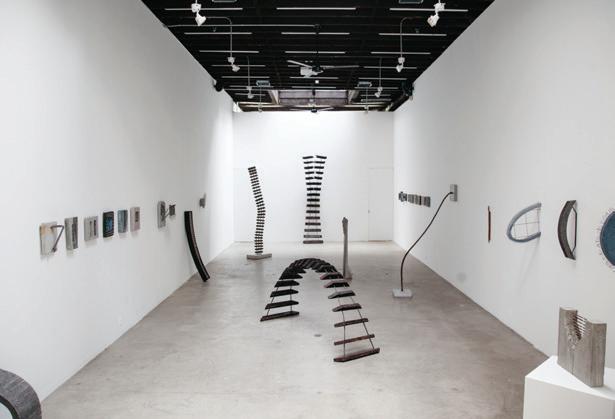JAG

Spring 2025


Spring 2025

Throughout this issue of The Jag, you will find stories that exemplify the best of Wellington — alumni who lead with purpose, students who embrace challenge, and a community that continually evolves while staying true to its values. As I reflect on my first year as Head of School, I am struck by how clearly Wellington’s mission shines through in every aspect of our work: we help students find their purpose and realize their potential for tomorrow’s world.
That mission has been part of Wellington’s DNA from the start. Our founders envisioned a school where students would love learning and teachers would love teaching. That vision is reflected in our new 5/4 upper school schedule, designed to foster deeper engagement and balance, giving students more time to immerse themselves in complex ideas and thoughtful discussions. It is also seen in The Paw Print, our student newspaper, where upper school writers explore everything from global issues to movie reviews. Whether in the classroom, on the stage, or in a debate, Wellington
students develop the confidence to ask hard questions and take ownership of their learning.
Our alumni are a testament to the lasting impact of that approach. Will Oremus ’00, now a journalist at The Washington Post, credits Wellington with teaching him to think critically and explore diverse perspectives. His journey from The Wellingtonian to one of the country’s leading newsrooms
As we look ahead, Wellington is poised to continue growing in ways that honor its founding vision while meeting the needs of the future. Whether through strategic investments in faculty, expanding opportunities for experiential learning, or strengthening connections with our alumni, we are committed to ensuring that Wellington remains a place where every student feels known, challenged, and inspired.
“Wellington is poised to continue growing in ways that honor its founding vision while meeting the needs of the future.”
ELIZA MCLAREN
underscores the importance of an education that prioritizes both intellectual curiosity and independent thought.
Creativity has always been a core part of a Wellington education, and the alumni featured in “Masters of Their Craft” show us just how far that creativity has taken them. Whether designing live events, recording music, or shaping the arts in new and unexpected ways, they embody the courage to pursue big ideas — something nurtured from their days on our campus.
Thank you for being part of this community. Whether you are a current student, an alum, or a supporter of Wellington’s mission, your engagement makes a difference. I hope you enjoy this issue of The Jag — and I hope you see your Wellington experience reflected in the stories within.
Thank you for all you do for Wellington, and... Go, Jags!

Eliza McLaren Head of School
THE JAG is published by Wellington for all members of its community. Please send any comments to Jessica Young at communications@ wellington.org.
EDITOR:
Jessica Young
CONTRIBUTORS: J.J. Bain ’06
Kim Catley
Jacob Ely
Liz Kazemi ’17
Idin Pirasteh ’97
Jacob Robinson ’10
Annie Shen ’26
Brandon Sullivan
Jessica Young
Liz Zimmerman ’13
COPY EDITORS: J.J. Bain ’06
Kim Catley
Christine Conkle
Melanie Eggleton
Elissa Francis P ’40
Amanda Pierce P ’40
Brenda Porter P ’12 ’17
PHOTO CREDITS:
Ben Anderson P ’28
Nick Fancher
Myron Fields
Grace Flynn
Tim Johnson
Kyle Long
Amanda Pierce P ’40
DESIGN: Bluewave Creative





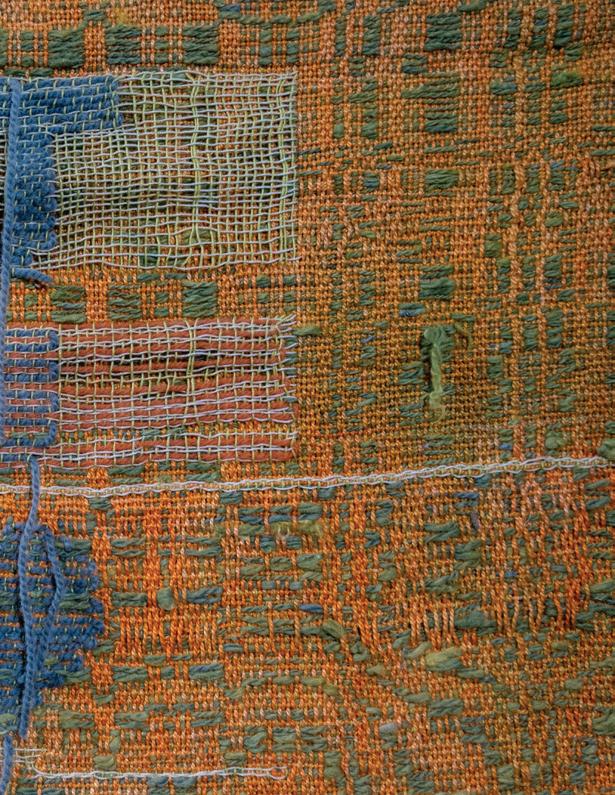


For Will Oremus ’00, asking bold questions started long before his byline hit national news. At Wellington, it began with a student article that sparked real conversation — and revealed the power of a well-told story.
From an early age, Oremus was drawn to asking questions and seeking answers. When his mother, longtime and well-respected Director of College Counseling Stuart Oremus P ’00, accepted the position at Wellington, he had the option to stay at another independent school or transfer. Intrigued by Wellington’s culture of
inclusivity and encouragement of student voice, he chose to make the switch in seventh grade. At Wellington, Oremus discovered an environment where curiosity was valued.
“I remember being sold on the idea of Wellington as a place that encouraged students to explore their interests broadly,” said Oremus.
Soon after enrolling, he signed up for several extracurricular activities. He played basketball on a team the yearbook jokingly described as “vertically challenged,” and joined the student government.
Then, when an English teacher suggested he write for the student newspaper, The Wellingtonian, Oremus jumped in with a story about a new science club. The club formed in
response to growing student interest in science competitions, but some students felt it didn’t receive enough institutional support.
Oremus’s reporting not only sparked discussions among students and faculty that highlighted Wellington’s commitment to student engagement, it also solidified a love of journalism that would set the course for his life.
By his senior year, he was The Wellingtonian’s editor-in-chief, relishing the opportunity to ask hard questions, engage in meaningful debates, and give students a voice.
After graduating, Oremus set his sights westward, attending Stanford University. Drawn to its academic

Wellington wasn’t about conformity — it was about supporting individuals in becoming who they wanted to be.”
programs and the allure of California, he pursued philosophy.
The broad, analytical nature of philosophy suited him well, but his passion for journalism never waned.
At Stanford, he quickly became involved with The Stanford Daily, working his way up to editor-in-chief. There, he honed his ability to distill complex ideas into accessible narratives — a skill that would become his journalistic signature.
“It always appealed to me that in journalism, every day was an opportunity to learn something new,” he said. “It’s like never having to choose just one field because you’re constantly exploring different topics.”
Oremus entered the field just as traditional print journalism careers were undergoing a significant shift. He spent his first four years working as a local news reporter in the San Francisco Bay Area. As he saw the landscape changing around him, he took a leap and enrolled in Columbia University’s mid-career master’s program in journalism — a move that propelled him into the leading edge of digital media.
Oremus first merged his journalistic instincts with his curiosity about
technology during an internship at the online magazine Slate. Like the media, the tech industry was rapidly evolving. Major questions about digital privacy, misinformation, and artificial intelligence were surfacing.
He told his editor at Slate that he was not interested in reviewing the latest gadgets. Instead, he wanted to explore how technology was reshaping society, privacy, and human behavior. The editors agreed and his blog, Future Tense, quickly gained traction. He later became Slate’s technology columnist, diving deep into topics like Facebook’s data privacy policies, algorithmic biases, and the shifting power of tech giants.
“It wasn’t just about the latest iPhone — it was about how technology was changing the way we live,” said Oremus. “My background in philosophy helped me think critically about the implications.”
After seven years at Slate, Oremus took his talents to Medium, a digital publishing platform, where he was part of an ambitious effort to build a journalism team. The venture was short-lived — like many media startups, it struggled to sustain a profitable journalism model. But Oremus’s reputation as a sharp, insightful writer remained intact and led him to The Washington Post, where today he
covers the intersection of technology, policy, and society.
For Oremus, journalism is more than reporting the news — it’s a responsibility to help people make sense of an increasingly complex world. He sees his role as not just explaining what’s happening but also interrogating why it matters and how it fits into the broader social and political landscape.
“In a time where misinformation spreads so easily, journalism has to be more than just relaying facts,” he said. “It has to provide context, accountability, and clarity.”
At The Washington Post, Oremus finds himself at the center of some of the most pressing debates of our time: How do social media platforms shape public discourse? What responsibility do tech companies have in moderating content? How should governments regulate artificial intelligence?
His work requires balancing the positives of technology with its sometimes unintended consequences, something he approaches with the same curiosity that led him to journalism in the first place. He strives to explain complex issues without oversimplifying them, making his writing engaging for both experts and everyday readers.
“I try to write in a way that has something for everyone,” said Oremus. “If someone deeply involved in tech reads my work, I want them to come away with a fresh perspective. If someone just getting into the topic

reads it, I want them to feel like they learned something without being overwhelmed.”
Reflecting on his journey, Oremus sees clear throughlines between his time at Wellington and his career. The sense of community, encouragement to question authority, and emphasis on independent thought all played a role in shaping the journalist he became.
His approach to reporting is informed by teachers like Sam Stewart P ’99 ’05 and Susan Bonvallet who challenged him to think critically, consider multiple perspectives, and engage in meaningful discussions.
“Wellington wasn’t about conformity — it was about supporting individuals in becoming who they wanted to be,” he said. “I was given the space to explore my interests, challenge ideas, and develop confidence in my own thinking. That’s exactly what I do as a journalist today.”
As technology continues to evolve at breakneck speed, Oremus remains at the forefront. At the Post, he drew on a cache of leaked internal Facebook documents to reveal how the social network’s algorithm prioritized posts that evoked strong emotions, including outrage. He was also among the first to explain how AI was flooding the web with fake, often misleading content. In recent months, he has chronicled the role of Elon Musk’s X in promoting and even shaping the Trump administration’s policies.
Amid his fast-paced career, Oremus finds balance in family life. He and his wife, Dr. Kimberly Oremus, a professor at the University of Delaware, are raising their 10-year-old son, a role that has given him a new lens through which to view the intersection of technology, media, and society.
He continues to apply the lessons he learned at Wellington: ask questions, seek understanding, and never stop being curious.
Wellington alumni are making waves in the creative world, turning their passions into inspiring and challenging careers. From the stages of New York to the studios of Los Angeles, they are shaping industries in music, visual arts, performance, literature, and beyond. Whether producing thoughtprovoking publications, managing high-profile live events, or pushing artistic boundaries through sculpture and sound, these graduates exemplify the spirit of curiosity and innovation fostered at Wellington.
Wellington has long been a nurturing ground for creative minds, providing a supportive environment that encourages exploration and growth. The alumni featured in this issue showcase how the confidence and skills they developed at Wellington have propelled them in their respective fields. Their journeys are a testament to the power of taking risks — an approach instilled in them during their formative years.
Their paths vary widely, but a common thread unites them: a deep appreciation for the creative freedom and encouragement they experienced at Wellington .
When Anna Rambo ’19 walks onto a set, she carries the spotlight with her. A classically trained ballerina turned actress, Rambo is making her feature film debut in “So Long, Farewell,” a coming-of-age story set in a fictional Wisconsin town — a project she believes captures the bittersweet magic of growing up and growing apart.
After studying musical theatre at Manhattan School of Music, Rambo followed her love of storytelling beyond the stage, diving into television and film with fearless determination. She now lives in New York, working across mediums and chasing roles that challenge and change her.
The spark was ignited at Wellington. Cast in “Little Shop of Horrors” in 10th grade, Rambo found a creative home in the theatre community — one that embraced all students, from the seasoned performers to the simply curious. “Wellington made me brave,” she said. “It made me someone who chases dreams.”
This spring, she returned to Wellington to see “Little Shop” again — full circle, and still in motion.
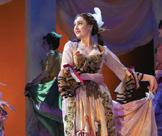

Tanya Pirasteh ’01 never planned on becoming an artist — but art had other ideas. During a moment of uncertainty, she enrolled in Columbus College of Art & Design and discovered a lifelong calling. Today, she’s a visual artist and educator, teaching drawing at the Priscilla R. Tyson Cultural Arts Center and steadily developing a body of work that explores identity through line, shape, and texture.
Her studio practice lives in tandem with her teaching — one discipline feeding the other. She helps students discover how to observe and express while holding herself to the same standard: to show up, to create, to grow.
At Wellington, Pirasteh’s creative inspiration found early expression in literature. “Studying English helped me become a better artist,” she said. “Learning to analyze text taught me how to analyze visual work.”
The connection between word and image still shapes her process.
For Pirasteh, art is not just what you make. It’s how you make sense.
When Ellie Rui瑞 瑞 ’20 plays, you feel it. The groove. The guts. The generosity. A jazz drummer with a sharp ear and a sharper instinct, Rui 瑞 studied under the legendary Billy Hart at the Oberlin Conservatory of Music before heading to Chicago, where she now splits her days between first graders at the University of Chicago Laboratory School and late-night sets.
She’s performed in professional concerts, organized shows like “Hopscotch with the Homies,” and is heading to Utah’s Fantasy Canyon to record with experimental sound artist Susie Ibarra. Her senior recital? Titled “A Mental Playground State.” And honestly, it tracks.
Rui 瑞 credits Wellington’s Blue Notes and James Becker P ’27 ’34, band director, for shaping her path. Between jazz band gigs, Becker gave her time, attention, and the drum kit after school. It made all the difference.
Now, Rui 瑞 瑞’s making her own rhythms — bold, brilliant, and beautifully her own.

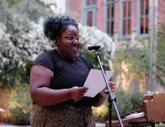
Before she published her first book, before she taught college students how to shape a sentence, Negesti Kaudo ’11 was just a Wellington kindergartener with library privileges. “I was one of four allowed to walk myself there,” she said. “I probably spent a third of my time at Wellington in that library. Maybe half.”
That early obsession with language never let up. After double-majoring in English and psychology at Elon University, she earned her MFA at Columbia College Chicago where she installed hybrid gallery projects, led workshops, and lived in the literary world. In 2022, she released her debut essay collection, “Ripe” — sharp, unflinching, and full of heart.
Now back in Columbus, she writes, teaches, reads, and leads — guiding writers through workshops at Literary Cleveland, The Kenyon Review, Vermont College of Fine Arts, and StoryStudio Chicago. Her work on the page continues to evolve, but so does her work in the room: as a teacher, a reader, a voice people trust to say the hard thing out loud. At Wellington, her artistry came early — Kafe Kerouac readings, interdisciplinary projects, and teachers who treated her words like they mattered. That kind of belief? She carries it forward — and passes it on.
Alex Brown ’04 didn’t take the straight line to art. He zigzagged from philosophy lectures at Boston University to sketchbooks in San Francisco, from moody studio corners in Brooklyn to custom clothing lines sold at Dover Street Market Ginza in Tokyo.
It wasn’t the plan. Law school was. But somewhere between Plato and painting, the urge to make things won out.
Largely self-taught, Brown built a practice grounded in daily work — drawing, painting, showing in group exhibitions, developing a quietly distinctive voice. During the pandemic, he explored his now-signature “men in suits” series — some of which now hang in the Soho menswear shop & son.
In 2023, he joined Brooklyn’s Small Talk Studio, where his illustrations now live on jackets, shirting, and custom commissions for stores around the world.
The earliest sparks? Wellington. A bright, paint-splattered art room. A cassette playing something weird and wonderful. A middle school class that felt like organized chaos. And later, an AP class taught by Nancy Mulick P ’05, former upper school art, where critique was conversation and creative freedom was the rule. “Everything was chaotic and so fun,” he said.
It still is. Just a little sharper around the edges.


Justin R. Cockrell ’21 is making a world of their own — one where quilting meets queerness, where craft becomes critique, and where a handwoven cloth can carry more meaning than a manifesto.
A fiber artist and educator in training, Cockrell studies craft/material studies and Spanish literature at Virginia Commonwealth University. Their work blends woodworking, metal, natural dye, and poetry to create objects that are as functional as they are fantastical — inspired by magical realism, sustainability, and the stories materials hold in the Anthropocene, the current geological age shaped by human impact on the planet.
Their art has shown at institutions from Virginia MOCA to the Bascom, with workshops at Penland, Haystack, and Yale Norfolk shaping their path. But it was at Wellington where their studio instincts first took root — from advanced art classes to theatre costuming to leading El Jag, a Latin culture club that became a meaningful space for expression and celebration. A gifted book from Jaime Bennati, upper school art, on natural dye and a senior art award further planted the seeds of their craft.
Now, Cockrell’s weaving not just objects, but ideas — and opening space for others to do the same.
“I want to teach,” they said. “Because joy and creation should always be shared.”
PHOTOGRAPHER
Jack Ludlam ’09 didn’t find photography right away. He just knew he liked being outside — with his mom’s old 35mm camera or nothing at all, watching the light shift across a landscape.
It wasn’t until his freshman year of college, behind a medium format film camera, that it clicked. The process. The patience. The stillness. It became the thing he chased.
Today, Ludlam is a photographer based in Denver whose work leans into nostalgia — images that feel like memories, even if you’ve never lived them. On the road or in the studio, he’s drawn to storytelling. A recent encounter with elders from a Native community reminded him that sometimes the most powerful part of photography is knowing when not to take the shot.
At Wellington, he struggled in the classroom but found meaning in small moments, especially with teachers who really saw him. “That kind of individual attention stuck with me,” he said.
He’s still paying attention. Still chasing the shot. Still making meaning from the light.

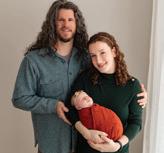
PREPARATOR COLUMBUS, OH
Zane Miller ’05 builds with questions. What happens if I bend the light? Shift the angle? What if the material pushes back?
He started asking those questions in the Wellington darkroom, where he spent hours making photograms and tinkering with light. “It was always, ‘What happens if I do this?’” he said. That curiosity — scientific, playful, relentless — never left.
Miller studied plant physiology and photography at Allegheny College, then spent six years painting in his parents’ garage and shooting concerts for Out of the Blue magazine.
Eventually, he traded the canvas for installation work and earned his MFA at Columbus College of Art & Design, where he broke open his process and started treating the studio like a lab.
Today, Miller’s work blends sculpture, light, and reflection to challenge perception. He’s also a lead art preparator at Beeler Gallery and runs a woodworking and welding business designing specialty supplies for other artists.
The tools shift. The scale grows. But the mission stays the same: test, learn, build, repeat. Wonder — on purpose.
These profiles barely scratch the surface. Scan the QR code to dive into full, in-depth features — stories of unexpected career turns, creative breakthroughs, and the lasting impact of a Wellington education. There’s so much more to explore, from behind-the-scenes insights to personal reflections.



By Jacob Robinson ’10

By Idin Pirasteh ’97

By Liz Kazemi ’17
By J.J. Bain ’06
Wellington’s newest initiative bridges alumni and student connections for mentorship, career insight, and lifelong support.
Since Wellington celebrated its first graduating class in 1989, our alumni have gone on to lead, create, and contribute in ways that make an impact.
It’s not just our alumni. Wellington’s extended community — our students, staff, faculty, parents, and alumni families — represents an extraordinary, yet largely untapped, network of expertise, innovation, and opportunity.
So what happens if a member of the Class of 2025 wants to tap into this wealth of talent for career advice, mentorship, or networking? Where would they begin?
Until now, there hasn’t been a clear path to harnessing the full power of our community.
That’s why we created JagsConnect — a new initiative designed to bring our community together in a meaningful and intentional way and ensure that every student and graduate can tap into the
vast knowledge and experience within the Wellington network.
The Wellington Alumni Advisory Board (WAAB) set out to answer a simple but crucial question: How can we better support our alumni and students in their career journeys?
During the 2023-24 school year, we launched a pilot initiative focused on recent graduates from the previous five years. WAAB board members — like Rene Haynes ’03 and Brad Biehl ’18 — reached out via LinkedIn, email, and text to ask, “What can WAAB do for you?”
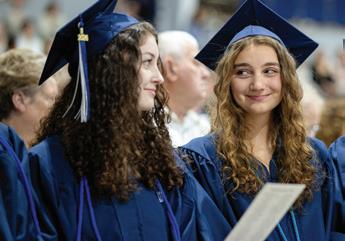
The responses confirmed what we suspected: Wellington alumni wanted career support and ways to intentionally connect with the community at large. We immediately began manually matching alumni with professionals in their fields of interest. The impact was clear — but so was the challenge. The process needed structure to scale up and be sustainable in the long term.
That’s when WAAB member Chris Noble ’10 suggested a more systematic approach: a digital platform where alumni and students could submit career requests and be matched with volunteers ready to help. That idea became the foundation of JagsConnect.
JagsConnect officially launched in fall 2024 as Wellington’s first structured career platform, designed to connect alumni, students, and professionals within the Wellington network for career support.
JagsConnect offers two ways to engage:
Request Support: Open to alumni and students looking for career advice, mentorship, internships, or job connections.
Offer Support: Open to alumni, parents of current students and alumni, staff, faculty, and community members willing to share their expertise and open doors for others.
Since its soft launch, JagsConnect has engaged more than 80 volunteers spanning industries from finance to the arts and beyond. Alumni have begun reaching out with requests, and we have facilitated eight career connections. Wellington’s community has always been full of leaders, entrepreneurs, creatives, and change-makers — and now, through JagsConnect, we’re channeling that energy into real, impactful connections.
When Jay Briggs Jr. ’19 wanted to learn about rotational programs at Fortune 1000 businesses in Central Ohio, he was connected with Cara Forester ’89
at Cardinal Health and Gareth Burghes ’08 at Worthington Industries. Briggs used insights from these conversations to land a role in Kimball Midwest’s Rotational Program.
By the start of the 2025–26 school year, WAAB hopes to grow the volunteer base to at least 150 professionals.
We will also expand JagsConnect into upper school programming, integrating it into the student experience through industry visits, résumé workshops, and professional development sessions. We thank Wellington staff and faculty, as well as WAAB members Brea Porter ’12 and Liz Kazemi ’17, and WAAB Student Representative Grant Spirko ’25 for their leadership on this expansion.
JagsConnect is about more than just career support — it’s about strengthening bonds within the Wellington community. Whether you’re a recent graduate looking for guidance, a student exploring career paths, or an industry leader eager to give back, this is your network.
Together, we’re turning Wellington into more than just an alma mater — we’re building a lifelong network and resource for success.
WANT TO REQUEST OR OFFER SUPPORT THROUGH JAGSCONNECT?
Visit www.wellington.org/ jagsconnect-get-started to get started as an alum or volunteer.

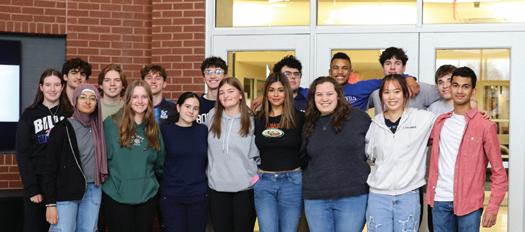
The Paw Print’s editors and writing staff

By
Annie Shen ’26, Paw Print Editor, with support from Kyra Hunter ’25, Shivum Kalyanam ’25, Lauren Sodhi ’25, and Charlie Lanning ’25
Since its founding, The Paw Print has served as an outlet for Wellington students to express their journalistic capabilities, creativity, and passions. The newspaper covers pressing issues and serves as a platform for respectful debate on controversial topics such as the Israel-Hamas war and the 2024 presidential election.
Students are also encouraged to submit articles regarding local Wellington events and personal passions — which in the past have included music reviews, animal
biographies, and even a cultural analysis of the movie “Free Birds.” This duality comprises the essence of The Paw Print.
Our editorial process revolves around balancing club meetings and individual work. We meet monthly to host a group brainstorming session regarding potential topics. This includes holidays, current events, sports season updates, and fun topics such as movie reviews and themed crossword puzzles.
The Paw Print’s Wellington focus is evident in our coverage, which ranges
from sports tournaments to faculty spotlights, and allows us to tie the upper school community together through journalism and creative media.
Ultimately, our goal is to: “inspire creativity, empower expression, and share student voices with the greater community.” As a result, each edition contains works that the creator takes pride in and is excited to see in the final publication.
This year, we have had creators embrace their passions in forms that


By Liz Zimmerman ’13
Get ready to put your creativity to the test with this Wellington-inspired Mad Lib!
If you’ve never played before, here’s how it works: One person is the reader and asks their partner for words (like “Give me a verb!”). The partner provides words without seeing the story. Once all the blanks are filled, read the completed story aloud and enjoy the hilarious results!
When you’re done, email communications@wellington.org for a chance to win a $10 gift card. The first five respondents to submit a photograph of their completed Mad Lib will win a $10 gift card. Wellington employees and students are ineligible to receive a prize.
Ready? Find a partner, grab a pen, and start filling in the blanks!
at Wellington
Duke the Jaguar is loved by everyone at Wellington. He cheers on the team, around the and is always . But have you ever wondered what Duke does when he isn’t cheering Wellington students on to victory?
Once everyone leaves for the day at , Duke becomes the of the school. His first order of business is heading to the Thomas Family Dining Room where he eats to fuel up for the night ahead. After dinner, he hits the gym where he meets up with his buddies and to play — he always wins, of course.
When Duke starts to feel a little , he makes his way to the BPAC to watch his favorite movie, on the big screen. As he’s starting to drift off to sleep, Duke remembers he has a test the next morning in ’s class! He runs off to grab his and hits the books.
After a full night of fun (and some studying…) Duke devours a midnight snack of and at the Sokol Store and goes upstairs to sleep for hours. Duke wakes up the next morning bright and early at , ready for his favorite part of each day – supporting Wellington students in everything they do! sport verb, plural


For years, the Rick O’Hara Room (ROHR) has been a flexible gathering space at Wellington. Now, thanks to a gift from Board Chair Jim Croft P ’17 ’20 ’22 and his wife, Michelle P ’17 ’20 ’22, it is being transformed into a dedicated home for kindergarten, featuring three purposebuilt classrooms and a flex area designed to support both structured learning and creative exploration.
This renovation is more than a physical update — it reflects Wellington’s commitment to designing environments that inspire curiosity, collaboration, and
a love of learning at every stage.
“Wellington’s youngest students deserve a space that meets them where they are — a place that is both playful and structured, joyful and intentional,” said Shelley Brown P ’32 ’33 ’38, assistant head of school for academics and head of early childhood and lower school. “By designing classrooms specifically for kindergartners, we are honoring their unique developmental stage while giving them room to grow, collaborate, and explore in ways that feel natural to them.”
The new kindergarten space will feature three spacious classrooms, room for collaborative learning, and direct access to the West Playground, reinforcing the importance of movement and outdoor exploration. Thoughtfully designed with input from Wellington’s early childhood faculty, the Learning Environments Committee, and Moody Nolan, the architectural firm behind the school’s 2023 addition, the renovation draws on best practices in early childhood education.
Each classroom will balance structure with flexibility, offering child-centered elements such as varied seating options, ample storage for hands-on learning materials, and warm, natural tones that create an inviting, home-like atmosphere.
“We know that young children learn best when they feel a sense of belonging, when they have opportunities to explore, and when their environment encourages both independence and collaboration,” said Brown. “Every detail of this space has been considered with that in mind — from the built-in mudroom that supports outdoor learning to the common area where students can engage in purposeful play together.”
For Jennifer Landon, early childhood lead, the excitement lies in imagining how students will bring the space to life.
“While I know the space will be beautiful, what truly exhilarates me is imagining how the students will make it their own,” said Landon. “As they begin the year, I can’t wait to see how the rooms evolve when filled with their creativity and interests.”
The relocation of kindergarten to the ROHR space does more than enhance early childhood programming — it also creates a more cohesive and connected experience for all students in the division. The shift brings Little Jags and prekindergarten closer together, streamlining student transitions and strengthening the early childhood community.
“From an operational perspective, this move allows us to be more intentional with space while creating a more seamless journey for families and students,” said Lindsey Smith P ’33, chief operating officer and director of athletics. “It will reduce congestion in the rotunda at drop-off and pick-up and better define the early childhood experience within our campus footprint.”
For the Crofts, supporting this project was about investing in something that will shape students’ first experiences in formal education for years to come.
“Wellington has always been a place that believes in meeting students where they are and giving them the tools they need to thrive,” said Jim Croft. “When we learned about the vision for this
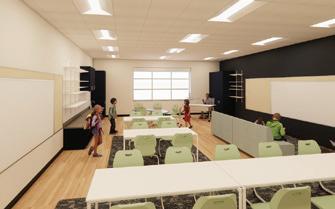
project, we saw an opportunity to help create a space where young learners could develop confidence, curiosity, and a love of school from the very start.”
“This is more than a renovation — it is a future-focused investment in our students and teachers, and it is the first step in a significant campus upgrade that will take shape over the coming years,” said Head of School Eliza McLaren. “Jim and Michelle’s generosity allows us to bring our vision for early learning to life, ensuring that Wellington’s kindergartners have a space designed specifically for their needs — a playful and structured place, joyful and intentional.”
Construction is set to begin in May 2025, with the goal of welcoming the first kindergarten class into the new space in early September. As Wellington continues to develop its campus master plan, this project serves as a model for how learning environments can be designed with student needs at the center.
For now, anticipation is building among teachers and students alike. As Brown put it: “We cannot wait to see the energy, laughter, and learning that will fill these spaces. Kindergarteners will always be kindergarteners — full of wonder, imagination, and enthusiasm. Now, they will have a space that is truly designed for them.”
Join the Croft Family in bringing the kindergarten of the future to life by making a gift to support this transformative project.


By Dr. Brandon Sullivan UPPER SCHOOL ACADEMIC DEAN
At Wellington, we believe that great learning starts with great design. The structure of our days should support the depth, flexibility, and engagement that define an exceptional education. Starting in the 2025-26 school year, the upper school will introduce the new 5/4 Schedule, a carefully designed model that enhances student learning and well-being.

This schedule is the result of years of research and collaboration. We analyzed student workloads, gathered faculty insights, and reviewed best practices in schedule design. The result is a model that provides students with more focused time for learning, increases instructional minutes, and introduces greater flexibility to support individual growth.
The 5/4 model reimagines the daily schedule by providing clearly defined frameworks for both five-day and fourday weeks, ensuring consistency and eliminating scheduling uncertainties when school weeks are shortened. This proactive approach allows Wellington to maintain instructional integrity, even when holidays or special events result in four-day weeks.
Rather than managing an eightperiod day with a required study block, students will now have a more structured approach with a rotating schedule that ensures each class meets for increased instructional minutes. Students are no longer required to take a study block, giving them the flexibility to enroll in up to seven academic courses while benefiting from an increase in weekly instructional time from 160 to 185 minutes. This adjustment allows for deeper engagement with content, more time for labs and discussions, and a more balanced workload across the week.
Lily Anderson P ’28 presenting her YouTube Scholar project to Kara Trent P ’26, upper school Spanish
Our decision to shift to a 5/4 Schedule is based on key priorities that align with Wellington’s mission:
Stephen Rosan ’25 remembers clearly the first time he spoke in a Debatriot meeting.
He started attending the group’s weekly discussions, hoping to connect with students and faculty who were equally interested in national and local issues. But Rosan knew his perspective was likely to be an outlier, so he first opted to listen in and build up his comfort level.
When the group debated the issue of gun control, Rosan was ready to speak up.
“In Debatriot, we strive to push people out of their comfort zone, but once that happens, you realize no one is going to hold [your opinions] against you or judge you,” said Rosan. “Once I felt that sense of community and belonging, I knew it was safe to say something.”
“That’s when I was able to stand up and speak my heart out.”
Respectful debates, thoughtful discussions, and even a few laughs – Debatriot fosters an environment where students can engage with big ideas while supporting one another. Mary Claire Thompson ’26 shares a smile during a lively discussion.
STEPHEN ROSAN ’25 “
In Debatriot, we strive to push people out of their comfort zone, but once that happens, you realize no one is going to hold [your opinions] against you or judge you.”
Wellington’s Debatriot Club equips students to have hard conversations about a host of topics. Unlike traditional debate clubs, meetings aren’t practice for competition. There are no winners and losers. The goal isn’t to change minds but to understand different perspectives and what drives another person’s beliefs.
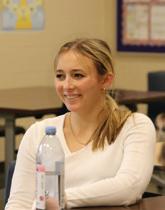
The student-led group meets every Friday during lunch and the entire upper school is invited to join the conversation. Rosan and his co-leaders, Shivum Kalyanam ’25 and Sigal Judd ’25, choose each week’s topic. Before each meeting, they distribute links to articles, op-eds, government websites, speeches, and other resources representing left, right, and center viewpoints.
Many of the topics stem from today’s hot-button issues: abortion, Ukraine and Russia, Israel and Palestine, and President Donald Trump’s executive orders. Others have a narrower lens, such as Wellington’s morning meeting policy.
“You hear the word ‘values’ circulating a lot,” said Judd, “but you can’t really tell what your values are until you are able to talk about them and question them. There needs to be a space for young people to achieve that understanding early on.”
Debatriot meetings follow a framework outlined in Glenn E. Singleton’s book “Courageous Conversations About Race.”
Chris Robbins P ’17 ’22, upper school English and Debatriot’s advisor, says that while the book focuses on race, the tactics apply to any issue.
Participants are expected to keep the book’s four agreements in mind:
Stay engaged: No phones, no side conversations, no talking over others
Experience discomfort: Hearing from someone you disagree with is uncomfortable — and that’s OK
Speak your truth: Even when your voice is different, be brave and express your opinion
Expect and accept non-closure: Courageous conversations aren’t about changing minds or finding quick solutions, but providing food for thought in an ongoing dialogue
While solutions aren’t a goal of Debatriot meetings, some conversations naturally lead to shifts in policies and practices.
Last year, for instance, they tackled the upper school’s daily morning meeting. Typically, the Student Council runs the meeting, and students line up to make announcements about club meetings, sporting events, classmate birthdays, and other reminders. However, some students started taking to the mic to share their feelings on issues of the moment — without any opportunity for discussion.
Head of Upper School Rishi Raghunathan P ’27 ’30 suggested that Debatriot schedule a time to talk about parameters for morning meeting.
Nearly 40 students showed up.

Ultimately, the Debatriot participants decided that students who feel passionately about an issue can raise it at morning meeting — so long as they’re inviting others to meet up later for a discussion.
“They were able to talk about how to make sure morning meeting is for everybody,” said Robbins.
Debatriot has also proven to be a pathway for Jags to continue the conversation outside of meetings. From time to time, Robbins and Rosan set aside their teacher-student dynamic and meet for lunch to discuss current events and politics as equals. Robbins turns to Rosan to understand the personal roots of his beliefs.

“Today’s climate is full of people yelling at each other and talking over each other,” she said. “But you can be passionate about something and still try to understand the experiences that led them to believe something. It’s not to change their mind, but to get a better understanding of the complexities of these issues.”
For Rosan, it’s another chance to find his voice and to know that others are listening.
“More crucial than the conversations, I believe, is learning to empathize with other people’s experiences,” he said. “That creates character development and allows them to become a better debater or conversationalist. The ability to listen to another person makes you a better leader and just a better person overall.”
Above: Shivum Kalyanam ’25 and Stephen Rosan ’25 leading a Debatriot meeting
Left: Debatriot leaders Sigal Judd ’25, Stephen Rosan ’25, Shivum Kalyanam ’25, and advisor Chris Robbins P ’17 ’22


PICTURED
As the lead speaker at Wellington’s annual Celebration of Black Voices, athlete turned actor Otis Winston had a simple message for students: It’s not about how you start, but how you finish.
“If something seems hard, keep going, don’t give up,” he said. “Your stutters aren’t a stumbling block, they’re a steppingstone.”
For Winston, those stutters are both literal and metaphorical. He stuttered as a child but later overcame the speech impediment. In sports, coaches and players told him he wasn’t a strong athlete, only to see the criticism pushed Winston to work harder. He went on to win high school championships and compete in basketball and track at The Ohio State University. And when he was told he would never be a full-time actor while living in Columbus, Ohio, Winston found a way, appearing in episodes of “The Chi” and “Empire” and the movie “Oz the Great and Powerful.”
Winston speaking to the middle and upper schools
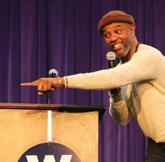
“I try to tell kids that they’re going to have bumps and obstacles,” he said, “but they can’t allow anything or anyone to make them give up or doubt themselves.”
Winston’s story is one of many examples of Black excellence that were given voice during Wellington’s monthlong Black History Month celebration, culminating in the Celebration of Black Voices on February 26.
Early childhood and lower school classes took an A-to-Z approach to spotlighting stories of Black excellence and joy. Each teacher chose a letter, which they mapped to a theme or person that represented an element of Black history. Students then researched the subject and created a hallway display. The last two weeks of February, students completed a scavenger hunt to guess each letter and theme.
Teachers linked the themes directly to classroom discussions. For instance, one class chose Dr. Mae Jemison, the first African American woman to travel in space, which dovetailed with their ongoing study of space.
“That way, it felt integrated into what they were doing, as opposed to it being a standalone piece,” says Erica Clark
P ’28, K-8 director of student success. “Because Black history is all our history.”
Some classes put a spotlight on famous Ohioans, while others chose themes that simply excited students, like Snoop Dogg affirmation songs, Zendaya, and women in sports. Clark says the project was a way to introduce Jags to Black leaders beyond those — like Martin Luther King Jr. and Rosa Parks — who typically feature in Black History Month.
The Celebration of Black Voices event pointed that same light on people within the Wellington community. The day opened with a performance of music by Black artists by the student jazz band, The Blues Notes, accompanied by singers Annika Raghunathan ’27 and Marla Tubuo ’29.
And after Winston’s remarks, he and Noah Berry ’18, held a special session with students in the Boys of Color affinity group. Berry played basketball at Wellington and now coaches a middle school team. He was also a member of 4A, an organization for students of all backgrounds that aimed to create a safe place to talk with likeminded people and where students of color could find shared empathy.
While Boys of Color’s activity has waned in recent years, Berry and
Winston facilitated a conversation in hopes of reigniting the group. Almost 20 middle and upper school students attended and asked questions about building character, navigating new situations, and what it takes to succeed.
Berry says he wants to create a safe space where students can talk through the issues they face — much like the environment he found in 4A.
“I’m the advisor, but I want the kids to run it,” he said. “They’re in the school daily and know what’s going on. I’m a big believer in letting them lead it and I bring in resources — especially alumni — to help them.”
Whether students were wandering halls lined with figures from Black history or listening to the words of local legends, Me-Chelle Burkhalter P ’22, who teaches middle school science and plans the Black History Month celebration, says the event has always been about finding joy and uplifting the community.
“We want to show Black history, but it doesn’t have to all be around slavery and hardship,” said Burkhalter. “We have to keep exposing our students to different cultures and encourage everyone to shine bright where they can.”

PICTURED
Baeli Wright ’35 participating in the scavenger hunt

By Jacob Ely DEVELOPMENT COORDINATOR
As one of Wellington’s founders, Ken Ackerman GP ’05 ’08 started building his legacy before Wellington’s doors opened in September 1982, and he’s still not quite finished.
Ackerman envisioned Wellington as a school that would provide his family with a better, more innovative independent education option in
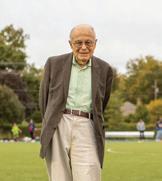

Central Ohio. “Wellington was the first co-ed independent school in Franklin County. We had no tradition behind us, so we could go wherever we wanted,” Ackerman reflected. “We were entrepreneurs. We didn’t know what couldn’t be done.”
The optimism and entrepreneurial spirit with which Wellington was founded has been instilled in the school’s culture, emboldening our students and educators to break free from the constraints of traditional education.
Though his own children could not attend due to timing, his grandchildren have since had the
PICTURED
Above: Gene Ackerman GP ’05 ’08, left, and her twin sister, Anne, who was also a teacher
Left: Ken Ackerman GP ’05 ’08
opportunity to experience the school he helped create.
Ackerman was not alone in his vision for Wellington. His wife, Gene Ackerman GP ’05 ’08, had a passion for early childhood education and was always a strong supporter of Wellington. As a teacher, Gene dedicated her life to educating young children and believed that to play is to learn. Gene sadly passed away in 2018. To honor his late wife, Ackerman contributed to Believing: The Campaign for Wellington and dedicated the new early childhood and lower school office suite to her.
In 2021, Ackerman further affirmed his lasting legacy with a planned gift to Wellington. The gift, which inducted him into the Wellington Legacy Society, was a tribute to Gene’s lifelong commitment to education. “Some people build memorials for their loved ones in cemeteries. I want to build my memorial to Gene through education and through Wellington,” Ackerman shared.
The Ackerman family has left an indelible legacy at Wellington through a lifetime of leadership, vision, and generosity. We are profoundly grateful to the Ackerman family for their lifetime of support to our mission, students, educators, campus, and culture.
At Wellington, that blueprint is brought to life by our faculty — the architects of curiosity, confidence, and character. They are the foundation of every student’s experience, designing classrooms that spark discovery and connection. Planned gifts help ensure that these educators continue to thrive — with the resources, support, and inspiration they need to shape generations to come.
With a planned gift, you’re not just supporting a school.
You’re helping build the future — one teacher, one student, one meaningful decision at a time.

By including Wellington in your estate plans, you become a member of the Wellington Legacy Society, gaining special recognition and exclusive event invitations. Join the Legacy Society:
Bequests:
Specify a gift to Wellington in your will or living trust.
Charitable Gift Annuities:
Receive lifetime income while supporting our mission.
Retirement Assets:
Designate Wellington as a beneficiary of your retirement accounts.
Life Insurance:
Name Wellington as a beneficiary of a policy.
Charitable Remainder Trusts:
Convert assets into income, with remaining funds benefiting the school.
IRA Gifts:
Make a tax-free distribution directly from your IRA.
Your planned gift can:
• Expand tuition assistance, broadening access to a Wellington education.
• Enhance facilities, fostering cutting-edge learning environments.
• Fund innovative programs that enrich student experiences.
• Support exceptional educators with essential resources.
LET'S BUILD THE FUTURE TOGETHER: Elissa Francis, Director of Development 614.324.1565 francis@wellington.org

Matt and Annie Arthur P ’27 ’29 first discovered Wellington when their niece enrolled in 2012. Curious about options for their young sons, Abbott ’27 and Arlo ’29, they explored Wellington themselves. By 2013, they had relocated to Columbus just to enroll Abbott in prekindergarten. “What impresses me most is that Wellington is always learning, growing, and seeking new information. Education can become stagnant, but Wellington refuses to be one of those places,” Annie Arthur explained.
Her family has been part of the Taco Bell system for over 45 years. The Taco Bell Foundation, founded in 1992, aims to educate and inspire future leaders — a mission closely aligned with Wellington’s. Seeing this connection, the Arthurs nominated Wellington for a Taco Bell Foundation Community Grant. Wellington’s proposal for a WellBeing and Belonging program was approved, supporting initiatives like the Girls of Color Symposium, professional development for counselors, and DEI training. “I’m so pleased with what Wellington has done with the funds. It’s critical to students’ and teachers’ growth,” she shared.
Beyond the grant, the Arthurs have supported The Wellington Fund for 12 years, prioritizing education in their philanthropy. In honor of Annie’s late Pa Pou, they also established a scholarship for their Taco Bell employees — furthering their deep commitment to education.
“Many schools have mission statements that are just platitudes. Wellington actually lives up to its mission,” shared Bob and Susan Thompson GP ’23 ’23 ’26 ’27 ’28 As grandparents of both current students and alumni, they’ve developed a deep appreciation for Wellington’s warm, inclusive community. “Our grandchildren want to come to school, and those who’ve gone on to college have been well-prepared,” said Bob Thompson. They credit Wellington’s focus on learning — rather than just grades — for equipping students with the skills they need to succeed.
This year, the Thompsons gave to the Wellington Scholarship Granting Organization (SGO) through the Ohio Association of Independent Schools, directly supporting student scholarships. “With the opportunity for a dollar-fordollar tax deduction, it’s a no-brainer,” he explained.
For the Thompsons, philanthropy is about giving back to institutions that have impacted their family. They’ve supported Wellington through both time and treasure, co-chairing Grandparents and Special Friends Celebration in 2014 and making a significant gift to Believing: The Campaign for Wellington.
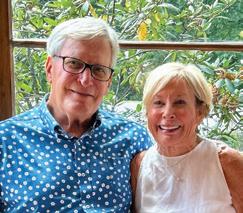

McLaren was featured in the November 2024 issue of Columbus Monthly, discussing the importance of cultivating the art of listening at Wellington and how it strengthens critical thinking and civil discourse. She also reflects on her lifelong passion for independent schools in the spring 2025 issue of the National Association of Independent Schools’ Independent School magazine. Growing up in a family of educators, McLaren saw firsthand the power of joyful, purposeful learning. As she completes her first year leading Wellington, she celebrates how faculty create that same transformative experience for every student.

EARLY CHILDHOOD LEARNING GUIDE
Marchant appeared in “Wild Strawberries,” an Available Light Theatre production that explored longing, belonging, and the search for home.

UPPER SCHOOL SPANISH
Mixon has written a new book, “The World That I See: Europe,” which follows a neurodivergent child on his trip across eight different countries in Europe. Each page showcases a beautifully illustrated destination that the child experiences in his own, unique way. This engaging story is the first of a series designed for readers of all ages who are interested in seeing the world from a new point of view.

LOWER SCHOOL SCIENCE SPECIALIST
Stager presented “Science Is for Everyone: How the Right Differentiation Sparks Science Inquiry in All Students” at the National Science Teaching Association (NSTA) conference. During her presentation, she shared strategies for building a culture of choice, developing differentiated assessments, and helping students set and achieve personalized learning goals.
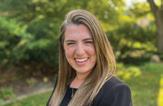
Pierce was selected for the Leadership Columbus Signature Program Class of 2025! Pierce has joined 57 other leaders in this prestigious program, showcasing her commitment to Wellington’s mission and the broader community.


UPPER SCHOOL ART
UPPER SCHOOL ART
Smith and Bennati showcased their work in “Those Who Can, Teach,” an exhibition at the Shot Tower Gallery on the Fort Hayes Campus. The show highlighted the contributions of art teachers from Central Ohio, each of whom invited a student to exhibit alongside them.

MIDDLE SCHOOL COUNSELOR
Ford was named a 2024 Everyday Kindness Hero for founding and serving on the board of Student Success Stores. This local nonprofit organization partners with schools to provide no-cost essentials to students.
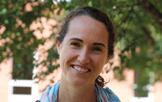
DIRECTOR OF ENVIRONMENT-BASED LEARNING
Elmore was featured on the “Green Champions” podcast. She shared how hands-on initiatives like composting, hydroponics, and rain gardens empower students to tackle real-world environmental challenges.

MIDDLE SCHOOL LANGUAGE ARTS
Davis published “Sinclair Lewis and the American Mind,” an essay exploring racial consciousness in mid-20thcentury literature. This is his second published work on Sinclair Lewis, following a 2022 essay on “Babbitt.”

EARLY CHILDHOOD AND LOWER SCHOOL COUNSELOR
Brenda Porter P ’12 ’17
UPPER SCHOOL ADMINISTRATIVE ASSISTANT
Tara Zimmer
UPPER SCHOOL COUNSELOR
LOWER SCHOOL PHYSICAL EDUCATION SPECIALIST
Newby, Porter, Zimmer, Laurie Beth Sweeney, former chief experience officer, and Tomu attended the National Association of Independent Schools People of Color Conference in Denver. The Conference focuses on building leadership skills to promote equity, justice, and belonging in independent schools.

K-8 DIRECTOR OF STUDENT SUCCESS
UPPER SCHOOL LEARNING SPECIALIST
Clark and Starker attended the Southern Association of Independent Schools Academic Support Conference and Curriculum Symposium, exploring research, strategies, and best practices to support all learners in independent schools.

MIDDLE SCHOOL STEM
Webber launched a science outreach business, bringing handson demonstrations and interactive activities to libraries, birthday parties, and community events. His venture merges a passion for STEM with a mission to make science engaging and accessible for all ages.

EARLY CHILDHOOD AND LOWER SCHOOL LITERACY
DIFFERENTIATION SPECIALIST AND COACH
EARLY CHILDHOOD AND LOWER SCHOOL INSTRUCTIONAL COACH AND LITERACY
INTERVENTION SPECIALIST
Ferguson and Rhomberg presented a workshop on play and literacy at Bank Street College of Education, supported by a Wellington student engagement grant. One of the most attended sessions, it drew creative, engaged educators eager to explore innovative teaching strategies.
An athlete’s love of the game rarely ends when they step off the field for the last time. For Wellington graduates Kara Concheck ’10 and Adam Stewart ’99, their passion for lacrosse has evolved into coaching careers at the collegiate level. Both serve as head coaches at Capital University — Concheck leading the women’s program and Stewart at the helm of the men’s team. Their journeys, shaped by their time at Wellington, have come full circle as they mentor the next generation of players.
Concheck didn’t start her Wellington athletic career with a lacrosse stick in hand. A standout basketball player, she was recruited to lacrosse by Adam Stewart ’99, who was then coaching Wellington’s team. He recognized her speed and athleticism. She quickly adapted to the game and became a key contributor to Wellington’s lacrosse success.
After graduating, Concheck continued her playing career at Fresno State University. Her transition to coaching began soon after college, first as an assistant at Oberlin College and later as the head coach at Saint Francis University. Now in her 10th season coaching at the collegiate level, she has returned home to Columbus to lead Capital University’s women’s lacrosse team.

Concheck’s coaching philosophy is rooted in relationships. “I take a personcentered approach,” she said. “Sport is a platform for life; through trials of character and leadership development, we build confidence and resilience.” As she fosters this mindset at Capital, she’s also raising her young son, Kasper, in the same environment, making the program feel even more like family.
One of the most meaningful aspects of her new role is sharing the sidelines with Stewart. “It’s a full-circle moment,” she said. “Adam was my coach, and now we’re leading programs side by side.”
For current Wellington student-athletes aspiring to play or coach at the next level, Concheck offers this advice: “Master the fundamentals of your craft while identifying the strengths that make you an asset to any team. And if coaching is your path, cultivate positive relationships and learn from mentors you admire.”
Stewart didn’t grow up envisioning a future in lacrosse. A die-hard baseball player, he only picked up a lacrosse stick in middle school because Wellington didn’t have a middle school baseball team at the time. By his sophomore year, lacrosse had taken hold and he was a key player on Wellington’s squad, helping lead the team to back-to-back state championship appearances.
After playing at Denison University under Hall of Fame coach Mike Caravana, Stewart transitioned into
Adam Stewart ’99

coaching, first as a student assistant at Denison and later as a collegiate coach. His coaching philosophy is a balance of structure and heart, blending “a little Ted Lasso with a poor man’s Nick Saban.” He credits his background in positive psychology and leadership development with shaping his approach, emphasizing both accountability and building a strong team culture.
Now in his second season at Capital — and first as head coach — Stewart sees the program as a rare opportunity. “It’s just old enough to be established but still new enough to be moldable,” said Stewart. “I wanted a program where I could put my fingerprints on it, and Capital gave me that chance.”
But perhaps the most rewarding part of this chapter in his career is coaching alongside Concheck. “It’s hard to understate how cool it is,” he said. “I recruited Kara to play lacrosse, and now, 20 years later, we’re colleagues. Seeing her journey from an upper school player to a collegiate head coach has been one of my proudest moments.”
For Wellington athletes looking to continue their playing careers, Stewart urges them to think beyond just the sport and consider the whole university. “Be open-minded. The biggest, shiniest opportunity isn’t always the best fit. Ask yourself — if I take the sport away, is this still the place I want to be?”
For those considering coaching, he emphasizes persistence: “Be willing to do all the jobs you don’t want to do, build your network, and take risks. The right opportunity will come.”
As Concheck and Stewart shape the future of Capital’s lacrosse programs, they carry with them the lessons learned on Wellington’s field — lessons of resilience, leadership, and community. Their journey from studentathletes to collegiate head coaches is a testament to the power of mentorship and the enduring impact of Wellington’s athletics. Now, as they build the next generation of players, their shared past continues to fuel their passion for the game.
Chase Guinn has begun his assignment in Santiago, Chile, as a foreign service officer with the U.S. Department of State.
Tanikka Price has been selected as the 2025 Visionary of the Year Award recipient by the Sexual Assault Response Network of Central Ohio and the Central Ohio Sexual Assault Awareness Month (SAAM) Planning Committee. At the 17th Annual Central Ohio SAAM Conference on April 9, 2025, she was presented with this prestigious recognition as a testament to her dedication, hard work, and outstanding commitment to this field and survivors in Central Ohio. Price currently serves as Health Impact Ohio’s chief education and equity officer.

Greg Davda Sr. was appointed to the Minority Development Financing Advisory Board of the Ohio Department of Development by Governor Mike DeWine. He was invited to the White House for the second time to speak on improving data collection practices for law enforcement to enhance transparency for local communities. Davda also married Lisa L. Shonk of Lancaster, Ohio, on September 21, 2024.

Do you have a new job, recent publication, or did you receive an honor or award? Did you recently marry, have children, or travel? Did you have a mini Wellington reunion with your classmates? The Wellington Alumni Office wants to share your good news with your fellow alumni.


Casey Osterkamp started as senior vice president and chief operating officer at TechPoint, Indiana’s digital innovation economy growth initiative. She will lead efforts to expand the region’s talent pipeline, enhance connectivity, and elevate the industry as part of the Central Indiana Corporate Partnership.
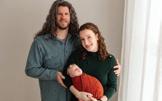
Zane Miller and his wife, Carmen, welcomed their child, Murphy Rose Miller, on December 6, 2024.
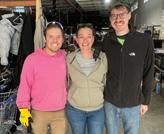
Ryan O’Neil launched Ryan’s Landscaping and Design + Lawn Care while serving as physical education and athletic director at Noble Academy in Columbus. In October, he traveled to western North Carolina to assist with Hurricane Helene recovery efforts.
Dom Ragusa has been named senior staff scientist at Geosyntec Consultants, a firm that helps private and public sector clients tackle environmental, natural resource, and infrastructure challenges.
THE CLASS OF
Jakaysha (Williams) Hookfin was promoted to advancement manager at Directions for Youth & Families in Columbus after six months as development & marketing coordinator. She was also accepted into the Columbus Impact Cohort and ran the Nationwide Children’s Hospital Columbus Marathon in October 2024.
THE CLASS OF
Clara Evans joined the International Trade Administration as a spring 2025 intern for the U.S. Department of Commerce. She is completing her third year at Georgetown University’s Walsh School of Foreign Service.
Joy Neal co-founded B.R.A.I.D. (Black Rowers Amplifying Inclusion and Diversity) to support Black rowers and serves as president of Tigers United, a student-athlete development program at Clemson University. A junior majoring in sociology with a minor in criminal justice, she competes on Clemson’s varsity rowing team.
Gavin Ray will join Nestlé as a summer 2025 chemical engineering R&D intern in Marysville, Ohio. He is excited to learn and work with an innovative team.
Jessie Seitz is studying abroad at Bond University on Australia’s Gold Coast. A hospitality and tourism management major at the University of Charleston, she looks forward to new challenges and global connections in her field.
Rhea Singh began a semesterlong internship at Perkins Spine and Sports Medicine in January 2025. A pre-med student at The Ohio State University, she is gaining hands-on experience in patient care, clinic coordination, and medical assistance.
THE CLASS OF
Katherine Kuttrus was elected vice president of risk management for the Ohio Iota Chapter of Pi Beta Phi at the University of Dayton. She looks forward to supporting the safety and well-being of her sisterhood.

Henry Allen completed the Pomona Half Marathon in 2024 and is enjoying his first year at Harvey Mudd College.
Armaan Chaudhary serves as a student senator in The Ohio State University’s Undergraduate Student Government, advocating for improved student living conditions. In the fall, he spoke with ABC 6 News about mold and mushroom infestations in Lawrence Tower. He aims to strengthen collaboration between student government and university administration to address housing concerns.
Olivia Robinson was named Pearson’s first campus ambassador for the University of Cincinnati and earned Dean’s List honors at the Lindner College of Business.

Members from the Classes of 2006-2025 participated in a men’s indoor soccer league in Columbus this winter and spring. The team finished the season top of the table and have enjoyed staying connected on and off the field.
